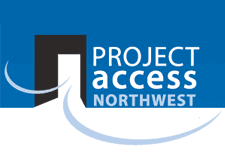Maintaining Access to Needed Specialty Services in King County

Grantee: Project Access Northwest
Timeframe: January 2015 – June 2018 | Total Amount: $540,000
Year 1: January 2015 – June 2015. Amount: $75,000
Year 2: July 2015 – June 2016. Amount: $150,000
Year 3: July 2016 – June 2017. Amount: $157,500
Year 4: July 2017 – June 2018. Amount: $157,500
The Maintaining Access to Needed Specialty Services in King County project facilitates specialists’ willingness to provide pro bono care for low-income King County patients who are referred by one of the safety net clinics (community health centers, free clinics, etc.) for needed specialty care services. Increasingly, Project Access NW will also facilitate specialists’ willingness to provide Medicaid-reimbursed care for low-income King County patients enrolled in Medicaid who need specialty care services. The program works with hospitals, labs, imaging centers and a myriad of other related ancillary services in the healthcare system that a specialist relies on to for services related to his or her specialty.
All patients served by this program live at or below 200% of the federal poverty level and are uninsured (78%) or enrolled in Medicaid (22%). To facilitate specialists’ willingness to provide pro bono care or accept the Medicaid reimbursement when partnering with Project Access NW, the program requires an engaged patient, a primary care home and a well-written and documented referral.
When a patient is referred to Project Access NW, a case manager reviews the patient’s enrollment packet to determine that the patient meets Project Access NW’s eligibility requirements. Once a patient is determined to be eligible for Project Access NW, their medical referral is reviewed by a registered nurses to determine if the referral is complete and to ensure that imaging and labs or other information that the specialty providers have requested prior to seeing the patient is available. If the information is not complete, a request is sent back to the referring provider for the additional information or request for a new referral to the appropriate specialty area (e.g. plastic surgery rather than dermatology for facial lesions).
Case managers provide support to physicians and other health care professionals who are willing to provide their services to clients. The case managers act as liaison between the patient and the specialist, setting and reminding the patient of appointments. If an interpreter is necessary at the appointment, one is scheduled. Case managers also work closely with the patients to assure that they follow the specialists’ treatment plans and return to primary care for ongoing and routine primary care services.
About Our Grantee
Project Access Northwest
Project Access Northwest collaborates with the health care community to open doors to medical and dental care for low income individuals with limited access.